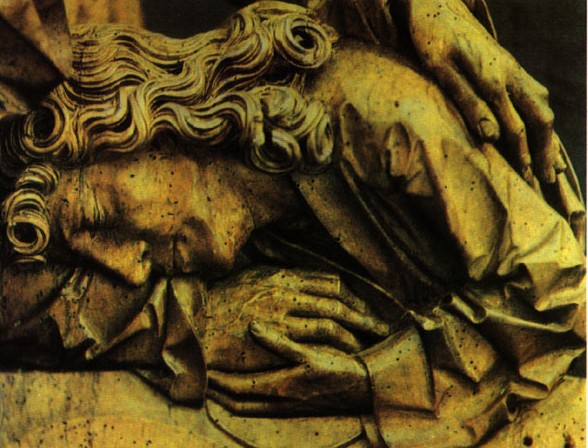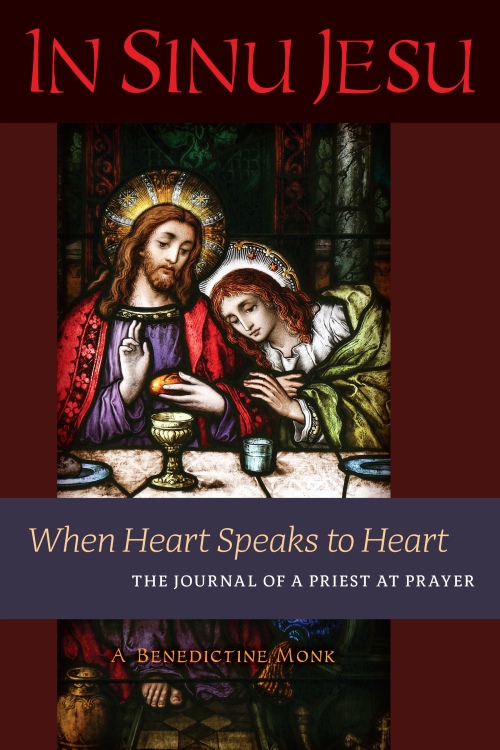A few weeks ago a friend of mine sent me a book by an anonymous Benedictine monk which had just been published: In Sinu Jesu. I have been reading it slowly in the adoration chapel of the seminary here in Heiligenkreuz, and although I haven’t finished yet, it has already made a deep impression on me. It is the sort of book that one wants to read in chapel; and this makes it difficult to write about. It a book about the intimacies of prayer, and therefore not one that lends itself to “blogesterial” discussion. It is a book that should be read in silence. It is a journal that the author kept at adoration, and consists largely of words “given” to Him by our Lord and our Lady. These words are mostly about prayer, and adoration, and sacrifice, about friendship with Jesus, and about the renewal of the priesthood. Readers who want to get a flavor of it can consult Peter Kwasniewski’s posts at Rorate Caeli and The New Liturgical Movement, as well as the excerpts that Dom Mark Kirby has posted at Vultus Christi.
One theme that struck me particularly was the theme of loneliness, and the flight from loneliness into the trap of distraction, and the necessity of withdrawing from distraction in order to feel the pain of loneliness so that that pain can be healed by Communion with God. This is a theme that I have been reflecting on from from a quite different perspective in my dissertation on David Foster Wallace, and so I was struck by the words on it here. Consider the following passage:
I want you to tell priests of the desires of My Heart. I will give you many opportunities to do this. Make known to them these things that I have made known to you. So many of My priests have never really heard and understood the invitation to an exclusive and all-fulfilling friendship with Me. And so, they feel alone in life. They are driven to seek out in other places and in creatures unworthy of the undivided love of their consecrated hearts, the fullness of happiness and hope and peace that only I can give them. So many go forward in bitterness and disappointment. They seek to fill the emptiness within with vain pursuits, with lust, with possessions, with food and drink. They have Me, very often, near to them in the Sacrament of My love, and they leave Me there alone… (p. 27)
The theme is of course a traditional one, because it has to do with the condition of fallen man as such. Exiled from friendship with God through original sin, mankind wanders through the regio dissimilitudinis, and tries to numb the pain through importunitas mentis, inquietudo corporis, instabilitas (vel loci vel propositi), verbositas, and curiositas.
The problem is a perennial human problem, but it takes on a particular character in the Cartesian universe of modernity, more prone to anxieties of isolation and insecurity that to those of dependence and finality (to use Fritz Rieman’s jargon). The classic modern expression was given at the very dawn of modernity by Pascal in his analysis of diversion in the Pensées, and it recurs throughout the modern era— not only in Catholic writers such as Walker Percy, but also in non-Catholic ones as diverse as Kierkegaard, Paul de Legarde, Heidegger, and David Foster Wallace. Wallace is particularly interesting because of his insistence on loneliness as the root problem (cf. my discussion of this on The Great Concavity). I need scarcely say that while I think those authors are good at setting up the problem, most of them do not have a clear grasp of the solution…
In Sinu Jesu treats the problem particularly as it presents itself in the priestly life. The author is both a monk and a priest, and he shows how fitting it is for all priests to live at least some elements of monastic life. These elements are aimed at leading the soul into the “desert,” as it were, where it is free of diversions and distractions, and becomes able to feel the pain of the loneliness of sin, in order then to receive the healing consolation of Christ. In the Western Rite, all priests are at least required to live a celibate life, and In Sinu Jesu is in part a wonderful reflection on the beautiful and prophetic witness of celibacy. And yet priests engaged in the cura animarum, especially in a modern world that is so intent on diversion (and so skilled in producing it) can so easily fall into diversion’s trap and in “seek in other places” the consolation that can only really be found in Christ.
One of the most moving things about In Sinu Jesu is the constant repeated message that in this earthly pilgrimage true consolation can be found easily in the Adoration of Christ in the viaticum, the way-bread of our journey, in which we already have a foretaste of the union with God that we hope for in Heaven:
There is no need for you or any priest to remain alone. My Heart is open to all my priest sons, and to those who ask for it, I will not refuse the grace of a special intimacy with me, a participation in the unique grace given Saint Joseph and Saint John in the beginning. (p. 36)
I am He who understands every man’s loneliness, especially the loneliness of My priests. I want to share their loneliness so that they will not be alone with themselves, but alone with Me. There I shall speak to their hearts as I am speaking to you. I am ablaze to be for each one of My priests the Friend whom they seek, the Friend with whom they can share everything, the Friend to whom they can tell everything, the Friend who will weep over their sins without, for a moment, ceasing to love them. (p. 14)
The revival of Eucharistic Adoration among the Catholic movements of our time is one of the more unexpected “signs of the times”. If one looks for signs of life in the Catholic Church in Western Europe, one finds them almost always in movements and groups who put a good deal of emphasis on Eucharistic Adoration. A development that became very visible at World Youth Day 2005 in Cologne. Who would have expected this development? The Liturgical Movement in the 20th century considered Adoration of the Blessed Sacrament outside of Mass to be a dangerous habit, which might lead hearts away from the Sacrifice of the Mass itself, into an “Emmanuel piety” of Divine presence divorced from the Cross (cf. Dom Gommaire Laporta’s extraordinary polemic Eucharistic Piety). But In Sinu Jesu shows how, properly understood, the Adoration of the Eucharistic presence leads into and deepens the participation in the Eucharistic Sacrifice:
Many priests do not have a real and practical faith in My Eucharistic presence. Do they not know that the Eucharist encloses within itself all the merits of My Passion? Let them recover the faith of their childhood. Let them come to find Me there where I am waiting for them and I, for My part, shall work miracles of grace and holiness in them. (p. 14)
In adoration, and from it, as from an ever-flowing fountain, you will receive the love that makes suffering precious and makes you like Me in the hour of My Sacrifice on the altar of the Cross. The more you adore Me, the better equipped you will be to accept suffering and to live it in union with My Passion… (p. 146)
In a way, In Sinu Jesu reads like a commentary on Pope Benedict XVI’s sermon at the closing Mass of World Youth Day 2005. Not a speculative commentary, but an experiential illustration. I’m convinced that any reader who is willing to enter into the spirit of this book will be inspired with a new desire for union with God in prayer. I cannot recommend it too highly.



Leave a comment